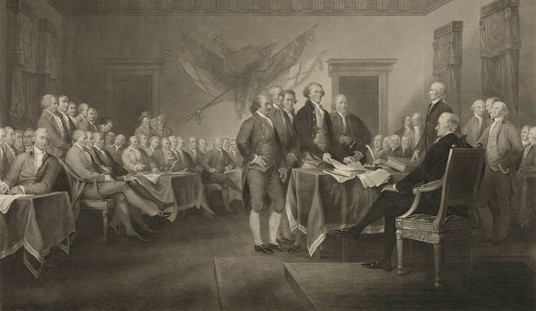As the Left grapples with Hillary Clinton's shocking electoral loss on Tuesday, many are pointing to her popular vote "victory" as if it proves something meaningful. It does not. Sure, it's a piece of interesting historical trivia that she will end up receiving more raw votes nationwide than Donald Trump, but presidential elections are decided based on the outcomes of 50 separate popular votes (plus DC, and setting aside the proportional systems in Nebraska and Maine), of which Donald Trump appears to have won 30. Those wins will reap him 306 electoral votes, well over the winning threshold.
Campaigns devise their strategies based on this system, which was ensconced by the founders at the Constitutional Convention. If Trump had been focused on winning the national popular vote, he would have allocated his time and resources very differently, angling to wring votes out of uncompetitive but vote-rich blue (California) and red (Texas) states, for example. To argue that Hillary's popular vote win diminishes the legitimacy or decisiveness of Trump's overall triumph is to argue that the rules and constitutional framework -- recognized and agreed upon in advance -- do not, or should not, matter. Furthermore, to complain that the electoral college system is 'undemocratic' is to cherry-pick a grievance based on an undesirable result. Buried at the very bottom of this USA Today piece highlighting that Senate Democrats also won the non-existent nationwide "popular vote" in their 2016 races (more on that in a moment) is this little nugget:
Republicans captured the majority of the "popular vote" for the House on Election Day, collecting about 56.3 million votes while Democrats got about 53.2 million, according to USA TODAY calculations. With a few races still undecided, Republicans so far hold a 239-193 majority for the next Congress.
House Republicans won the (truly nationwide) "popular vote" by roughly three million votes. This clearly means that they should control all 435 seats in Congress' lower chamber, or democracy is dead, or something! Popular vote! Three million! Except...that's not how the system works. And everyone knows it. Just as everyone knows how the electoral college determines the presidency. That's why many liberals' favorite-turned-least-favorite website is called FiveThirtyEight, after all. Republicans won a majority of House seats by dint of winning approximately 240 miniature popular vote elections in individual Congressional districts. Donald Trump won a majority of the electoral college by winning about 60 percent of state-level popular votes for president. Finally, a word on the aforementioned Senate statistic: Tallying the "popular vote" in those races is even less useful than in the presidential or House contexts. Why? Only one-third of Senators were up for re-election this cycle, so we're already talking about a fraction of the chamber. Indeed, the majority of each party's US Senators were not on the ballot in 2016.
Recommended
Furthermore, because of how the rotation worked out this time, there were Senate elections in the huge, vote-heavy blue states of New York and California, whereas there was no Senate race in Texas, the most populous red state. Beyond that, due to California's relatively new election system, the GOP did not even field a general election candidate for US Senate at all, so that state's millions of Republican voters were faced with the prospect of either backing one of two liberal Democrats, or sitting the race out altogether. For reference, at last count, nearly three million Californians voted for Donald Trump; close to five million backed Mitt Romney four years ago. That's are a lot of arguably-disenfranchised California Republicans in an all-Democrat Senate race. The USA Today story acknowledges this dynamic, and offers an interesting concession:
In California, for example, there were two Democrats — Kamala Harris and Loretta Sanchez — competing for an open Senate seat, with no Republican on the ballot. Together, they received 7.8 million votes. If you count only Harris' winning vote total of 4.9 million, Democrats still tally 42.2 million votes. Had a Republican Senate candidate in California captured as many votes as Sanchez did — about 2.9 million — the total for the two parties nationwide would have been about even.
Ah. So if the GOP hadn't been shut out of California's race, the national "popular vote" total of the in-cycle Senate contests would likely have been approximately tied between the parties. Some might point out that Republicans failed to qualify a top-two finisher in the "jungle primary" system, so they weren't 'robbed,' rendering this whole hypothetical irrelevant. Absolutely true. They lost fair and square under the established rules. And the same can be said of the legitimate victories racked up by Donald Trump, House Republicans and Senate Republicans.

























Join the conversation as a VIP Member